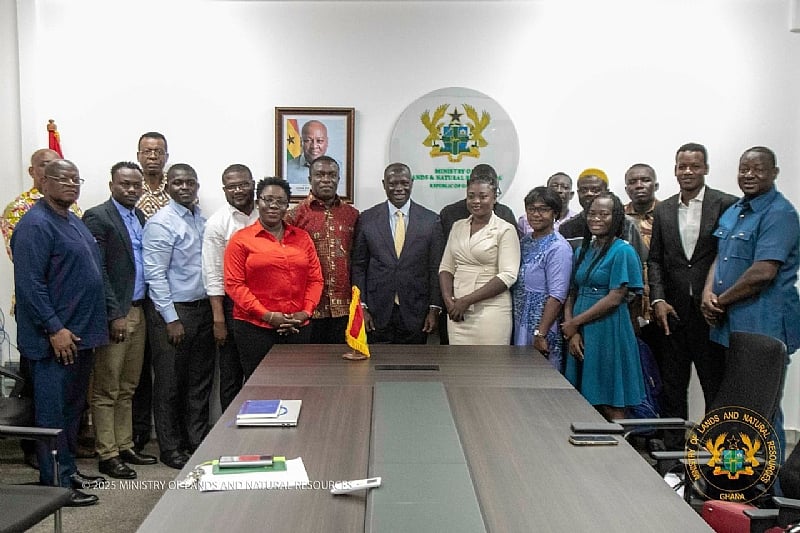The escalating crisis of illegal mining, commonly known as “galamsey,” in Ghana has prompted a renewed call for collaborative action, with the media identified as a crucial partner in combating the menace. Mr. Emmanuel Armah-Kofi Buah, the Minister for Lands and Natural Resources, emphasized the media’s pivotal role during a media engagement in Accra aimed at galvanizing support to tackle the pervasive issue, particularly the devastating impacts on water bodies and forest reserves. He highlighted the dire situation inherited by the current administration, revealing that nine forest reserves were already under the complete control of illegal miners upon assuming office, painting a stark picture of the entrenched nature of the problem. This underscored the urgency and scale of the challenge facing the government in its efforts to reclaim these vital natural resources and restore environmental integrity.
The Minister painted a grim picture of the environmental consequences of galamsey, citing alarming statistics on water pollution. He disclosed that turbidity levels in water treated by the Ghana Water Company Limited were exorbitantly high, ranging between 5,000 and 12,000 NTU (Nephelometric Turbidity Units), a measure of water clarity. This represents a staggering tenfold increase over the acceptable limit of 500 NTU for water treatment, highlighting the severe contamination caused by illegal mining operations. Furthermore, the extent of land degradation was equally concerning, with an area equivalent to approximately 7,500 football fields ravaged by illegal mining activities. This widespread destruction not only threatens biodiversity and ecosystem services but also poses significant risks to food security and the livelihoods of communities dependent on these lands.
To effectively combat this multifaceted challenge, the government has adopted a comprehensive five-pronged approach. The first pillar focuses on strengthening law enforcement by intensifying crackdowns on illegal mining operations. This involves bolstering the capacity of law enforcement agencies to apprehend and prosecute perpetrators, thereby deterring further illegal activity. Secondly, the government is restructuring its monitoring teams to enhance vigilance and prevent complacency, recognizing the need for constant oversight to curb the resurgence of illegal mining. Engaging traditional leaders and local authorities in the licensing process forms the third component of the strategy, recognizing their crucial role in local governance and resource management.
The fourth element of the government’s strategy involves leveraging technology to monitor mining activities in real-time. Deploying advanced technologies such as satellite imagery, drone surveillance, and GPS tracking can provide timely and accurate information on illegal mining operations, enabling swift intervention and enforcement. Finally, the government emphasizes the importance of raising public awareness to foster collective responsibility in protecting natural resources. This entails educating the public about the detrimental impacts of galamsey and empowering communities to actively participate in monitoring and reporting illegal mining activities. This multi-pronged approach aims to address the root causes of galamsey, strengthen enforcement, and promote sustainable resource management.
A critical flaw identified in the existing framework was the centralized nature of the mining licensing system. The Minister acknowledged that this centralized process had marginalized traditional rulers and local government officials, effectively weakening their oversight and contributing to the proliferation of illegal mining. By centralizing control, the system inadvertently created opportunities for corruption and circumvention of regulations. To rectify this, the government is implementing a decentralized licensing regime, empowering traditional authorities and District Security Councils as the primary points of approval for mining permits. This decentralization aims to enhance local ownership and accountability in managing natural resources and curbing illegal mining activities within their jurisdictions.
Mr. Buah concluded his address by urging the media to maintain its vigilance and objectivity in reporting on the fight against galamsey. He emphasized the importance of accurate and unbiased reporting to inform public discourse and hold stakeholders accountable. He also cautioned against politicizing the issue, stressing the need for a unified national response to effectively combat this environmental crisis. The media’s role in exposing illegal activities, highlighting the devastating consequences, and promoting public awareness is crucial in galvanizing public support and ensuring the successful implementation of the government’s comprehensive strategy. By working together, the government, media, and the public can safeguard Ghana’s natural heritage and ensure the sustainable management of its resources for generations to come.














